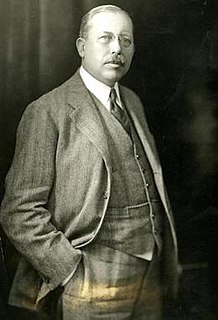A Quote by Aldous Huxley
The whole story of the universe is implicit in any part of it. The meditative eye can look through any single object and see, as through a window, the entire cosmos. Make the smell of roast duck in an old kitchen diaphanous and you will have a glimpse of everything, from the spiral nebulae to Mozart's music and the stigmata of St. Francis of Assisi. The artistic problem is to produce diaphanousness in spots, selecting the spots so as to reveal only the most humanly significant of distant vistas behind the near familiar object.
Related Quotes
Since I found that one could make a case shadow from a three-dimensional thing, any object whatsoever - just as the projecting of the sun on the earth makes two dimensions - I thought that by simple intellectual analogy, the fourth dimension could project an object of three dimensions, or, to put it another way, any three-dimensional object, which we see dispassionately, is a projection of something four-dimensional, something we are not familiar with.
The story of the universe finally comes to an end. For the first time in its life, the universe will be permanent and unchanging. Entropy finally stops increasing because the cosmos cannot get any more disordered. Nothing happens, and it keeps not happening, forever. It's what's known as the heat-death of the universe. An era when the cosmos will remain vast and cold and desolate for the rest of time the arrow of time has simply ceased to exist. It's an inescapable fact of the universe written into the fundamental laws of physics, the entire cosmos will die.
Fame it's like... When you look through a window, say you pass a little pub, or an inn. You look through the window and you see people talking and carrying on. You,can watch outside the window and see them all being very real with each other. But when you walk into the room, it's over. I don't pay any attention to it.
I think it's possible for me to approach the whole problem with a broader scope.When you look at something through an, an organizational eye, whether it's a, a religious organization, political organization, or a civic organization, if you look at it only through the eye of that organization, you see what the organization wants you to see. But you lose your ability to be objective.
Meditation is object-less. If you use any object, then it is not meditation; it becomes thinking. It becomes contemplation; it becomes reflection, but not meditation. This is the most essential point to be understood. This is the essence of a meditative state: that it is object-less. Only consciousness is there, but not conscious ABOUT anything. Consciousness without being conscious of anything - this is the nature of meditation.
Any object not interesting in itself may become interesting through becoming associated with an object in which an interest already exists. The two associated objects grow, as it were, together; the interesting portion sheds its quality over the whole; and thus things not interesting in their own right borrow an interest which becomes as real and as strong as that of any natively interesting thing.
All changes in space which we see, hear, smell or taste are literally tactile impressions. All our senses are variations of our unique sense of touch. Two approaching objects touch one another when they finally meet without a noticeable space between them. ... This is what happens in any condensing matter in which the outer aspects move towards a centre... Each single part of matter approaches its neighboring part until the two collide, causing an impact or a pressure. It is space, which appears and disappears between and round object and in the movements of the particles of the object.



































